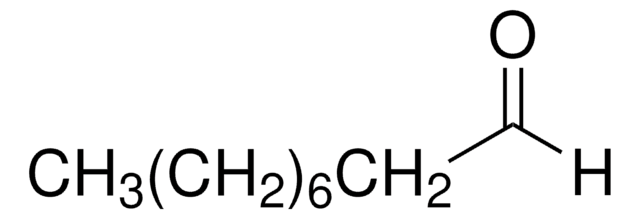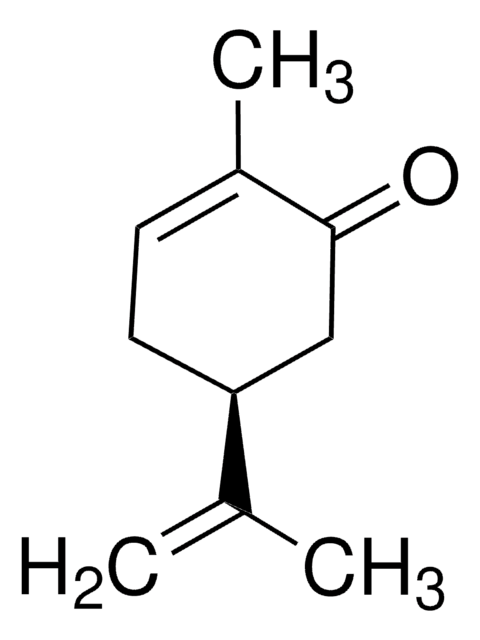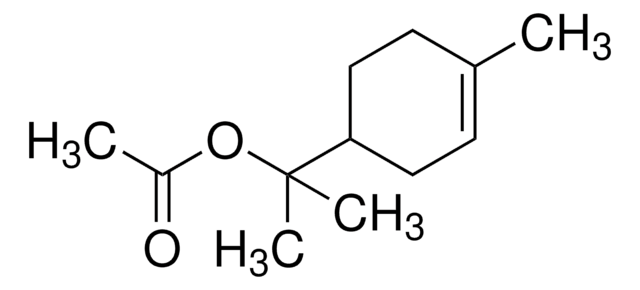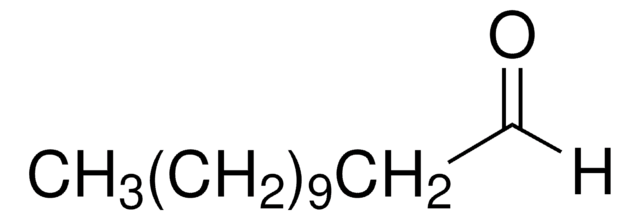W236217
Decanal
natural, ≥97%, FG
Synonym(s):
Caprinaldehyde, Decyl aldehyde
About This Item
Recommended Products
biological source
Cocos nucifera
Quality Level
grade
FG
Fragrance grade
Halal
Kosher
natural
Agency
follows IFRA guidelines
meets purity specifications of JECFA
reg. compliance
EU Regulation 1223/2009
EU Regulation 1334/2008 & 178/2002
FDA 21 CFR 182.60
vapor density
>1 (vs air)
vapor pressure
~0.15 mmHg ( 20 °C)
Assay
≥97%
form
liquid
greener alternative product characteristics
Less Hazardous Chemical Syntheses
Use of Renewable Feedstocks
Learn more about the Principles of Green Chemistry.
refractive index
n20/D 1.428 (lit.)
bp
207-209 °C (lit.)
density
0.83 g/mL at 20 °C
0.83 g/mL at 25 °C (lit.)
application(s)
flavors and fragrances
Documentation
see Safety & Documentation for available documents
food allergen
tree nuts
fragrance allergen
no known allergens
greener alternative category
Organoleptic
orange; citrus; floral; waxy; sweet
SMILES string
[H]C(=O)CCCCCCCCC
InChI
1S/C10H20O/c1-2-3-4-5-6-7-8-9-10-11/h10H,2-9H2,1H3
InChI key
KSMVZQYAVGTKIV-UHFFFAOYSA-N
Looking for similar products? Visit Product Comparison Guide
Related Categories
General description
Application
- (14)C-Isotope Use to Quantify Covalent Reactions between Flavor Compounds and β-Lactoglobulin.: This article details a method using C-14 isotopes to track the covalent bonding of Decanal to proteins like β-Lactoglobulin, providing a new approach to understanding flavor compound interactions, essential for food science research (Shepelev and Reineccius, 2024).
Signal Word
Warning
Hazard Statements
Precautionary Statements
Hazard Classifications
Aquatic Chronic 3 - Eye Irrit. 2
Storage Class Code
10 - Combustible liquids
WGK
WGK 2
Flash Point(F)
181.4 °F - closed cup
Flash Point(C)
83 °C - closed cup
Personal Protective Equipment
Regulatory Listings
Regulatory Listings are mainly provided for chemical products. Only limited information can be provided here for non-chemical products. No entry means none of the components are listed. It is the user’s obligation to ensure the safe and legal use of the product.
PRTR
Class I Designated Chemical Substances
FSL
Group 4: Flammable liquids
Type 3 petroleums
Hazardous rank III
Water insoluble liquid
ISHL Indicated Name
Substances Subject to be Indicated Names
ISHL Notified Names
Substances Subject to be Notified Names
JAN Code
W236217-1KG-K:
W236217-VAR-K:
W236217-BULK-K:
W236217-25G:
W236217-BULK:
W236217-100G:
W236217-25G-K:
W236217-SAMPLE:
W236217-100G-K:
W236217-1KG:
W236217-SAMPLE-K:
Choose from one of the most recent versions:
Already Own This Product?
Find documentation for the products that you have recently purchased in the Document Library.
Customers Also Viewed
Our team of scientists has experience in all areas of research including Life Science, Material Science, Chemical Synthesis, Chromatography, Analytical and many others.
Contact Technical Service








